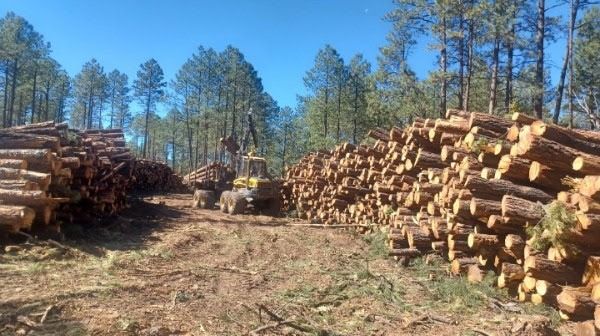Zuni Mountain Project Fuels Conservation and Communities

Located within the Cibola National Forest in New Mexico, the Zuni Mountains are home to the National Wild Turkey Federation’s largest and oldest stewardship project.
In collaboration with the USDA Forest Service, the NWTF’s Zuni Mountain Stewardship Project exemplifies a multi-faceted approach to conservation, forest health and community support. The project recently received a substantial $860,000 boost in funding from the Forest Service, enabling expanded efforts to enhance more habitat and undertake critical emergency road repairs crucial for accessing remote areas.
Since its inception in 2010, this ambitious, 14-year effort has focused on thinning overgrown timber stands and reducing fuel loads through various forest management practices, such as prescribe burning and timber stand improvement. These practices aim to mitigate the risk of catastrophic wildfires while fostering healthier, more resilient forest ecosystems. For instance, once areas are opened from overly dense vegetation, the increased sunlight to the forest floor stimulates the growth of native vegetation. This improves habitat for wild turkeys, pollinators, elk, deer and many other species.
The ultimate goal is to restore the landscape to an ecosystem that is resilient to climate change, resistant to catastrophic wildfires, supports thriving wildlife populations and enhances local communities.

A unique aspect of the Zuni Mountain Stewardship Project is its integration with the Wood for Life program, a collaborative initiative turning forest restoration efforts into a source of warmth and resilience for Indigenous communities.
One challenge in large-scale thinning operations is the question of what to do with smaller-diameter wood that lacks commercial value. The Wood for Life program bridges this gap by providing firewood from small-diameter timber removed during thinning operations. The salvaged wood is then distributed to indigenous communities reliant on firewood for heating.
In partnership with the National Forest Foundation, the Zuni Mountain Stewardship Project supplied 250 loads of wood in November to the Navajo Nation’s Wood for Life program. These resources will be distributed to the Standing Rock and Rock Springs Chapters and wood banks in the Nahata Dziil and Rama Chapters.
“When we restore the forest, we’re not just enhancing habitat for turkeys and conserving these vital ecosystems, but we’re also ensuring resources for communities who rely on them,” said Chuck Carpenter, NWTF district biologist for Utah, Idaho, Arizona and New Mexico.
The Zuni Mountain Stewardship Project and the Wood for Life program highlight the synergistic potential of collaborative conservation. By reducing wildfire risks, these initiatives protect critical habitats for wildlife, including wild turkeys, while the salvaged timber serves as a vital resource for Indigenous communities.
“This isn’t just firewood — it’s a connection between the forest’s resilience and the resilience of the communities we serve,” Carpenter said.
This work reflects the life-changing power of the outdoors and the far-reaching impact of conservation efforts. Through collaboration, innovation and shared stewardship, these projects are not just protecting forests but also fostering resilience for wildlife, landscapes and people alike.

